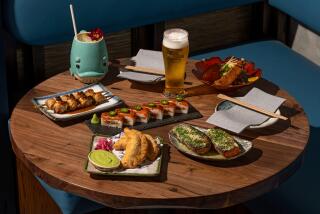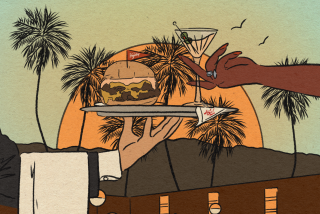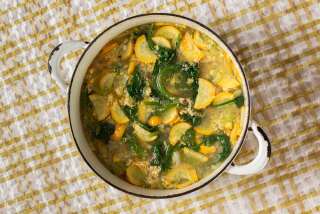Shari and Judi Zucker dish on healthful, tasty snacks
Shari and Judi Zucker became vegetarians as teenagers, shared high school records in the mile and two-mile and became authors together at 17.
“We’ve been walking our talk — running our talk — since we were 16,” says Judi.
Their first book, “How to Survive Snack Attacks Naturally,” was featured in the Los Angeles Times on Jan. 10, 1984. Even then it was clear why their father, publicist Irwin Zucker, named them the Double Energy Twins — which conveniently has become https://www.doubleenergytwins.com.
Their latest book, their fifth, “The Ultimate Allergy-Free Snack Cookbook,” speaks to the millions of Americans who have food allergies, with more than 100 plant-based, sugar-free recipes. Between them, the twins have five children — one set of twins — and just one child with food allergies.
Shari and Judi say they have been close since they were “wombmates,” and they often talk over each other, as they did when they shared some thoughts about kids and healthful eating.
What’s the landscape like these days for healthful eating? What’s changed over time?
“People are becoming more aware of GMOs, genetically modified organisms, and that’s changed the way people are thinking. In the ‘70s and ‘80s, food was pure, we feel. And then [once GMO products became common], the makeup of the food wasn’t natural anymore. And the food allergies have developed,” Judi says.
“We’ve also seen such a change in the variety of plant-based foods that are available,” Shari says.
When they became vegetarians, “we were almost like junkatarians. We didn’t know that much. At the time you used dairy products or eggs, and it was considered healthy. But we have found there is definitely more awareness in the quality and the variety of products available.
Why is there a need for a cookbook for people with food allergies?
“This problem is not going away. If someone has celiac disease, they have that for the rest of their lives and they have to be really careful about gluten,” Shari says. “Those kinds of food allergies will never go away. But they have found that many children can sometimes outgrow allergies. … We are interested in the cause as much as the cure.”
What do you say to parents who tell you they can barely get meals on the table let alone deal with homemade snacks?
“We get that kind of question all the time,” Shari says. “We try to make all of our recipes easy and tasty because we don’t want to spend all the time in the kitchen either. We’re all busy moms. … The cool thing is when you make many of these recipes, they can be stored in the refrigerator for seven days or in the freezer for months. We are a society of convenience.”
“Parents are the ones who influence their kids on eating. That’s right off the bat. If a parent is not eating healthfully and snacking healthfully, you can’t expect if from the kids,” Judi says.
What kind of eaters are kids these days? Getting pickier?
“Kids have always been known to be picky eaters, and they’re brutally honest too if they don’t like something,” Shari says. “The key is, it depends on the family dynamic. If the kid is always eating processed foods, that’s going to be the initial thing. We use real maple syrup, and [a child visiting us] wanted to know if we had the artificial kind, the kind that has 2% maple syrup, because that’s what her taste buds were accustomed to. But taste buds can be adapted.”
“We’re pretty strict here. If you are hungry enough, you will eat it,” Shari says. “When they were young and I’d take them to the beach, I would cut up red and yellow pepper, and that would be their snack.”
What was the hardest thing to adapt for your book?
“Making the pizza was the hardest. Taking the wheat out made it difficult to get the right consistency. If they’re looking for the exact taste of something that has wheat and dairy, they’re not going to get it. But it still may be tasty. We make everyone’s favorite oatmeal raisin cookies, and we love them,” Shari says.
“Taking the soy out was the hardest,” Judi says. “When it comes to snacks there are so many ready-made processed foods with soy in it. That was something we learned we could modify. The little veggie dogs and all these things. We wanted them organic, and 90% of soy is GMO, and we just don’t believe in that.”
“When people say, ‘Oh, I have to take this out of my diet?’ They feel despair,” Judi says. “But despair breeds creativity.”
More to Read
Eat your way across L.A.
Get our weekly Tasting Notes newsletter for reviews, news and more.
You may occasionally receive promotional content from the Los Angeles Times.







